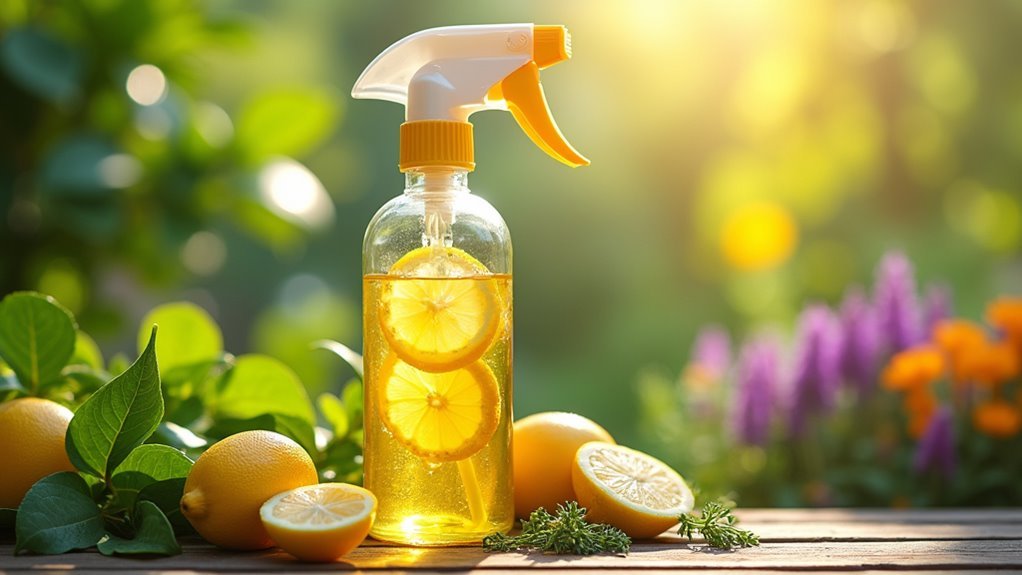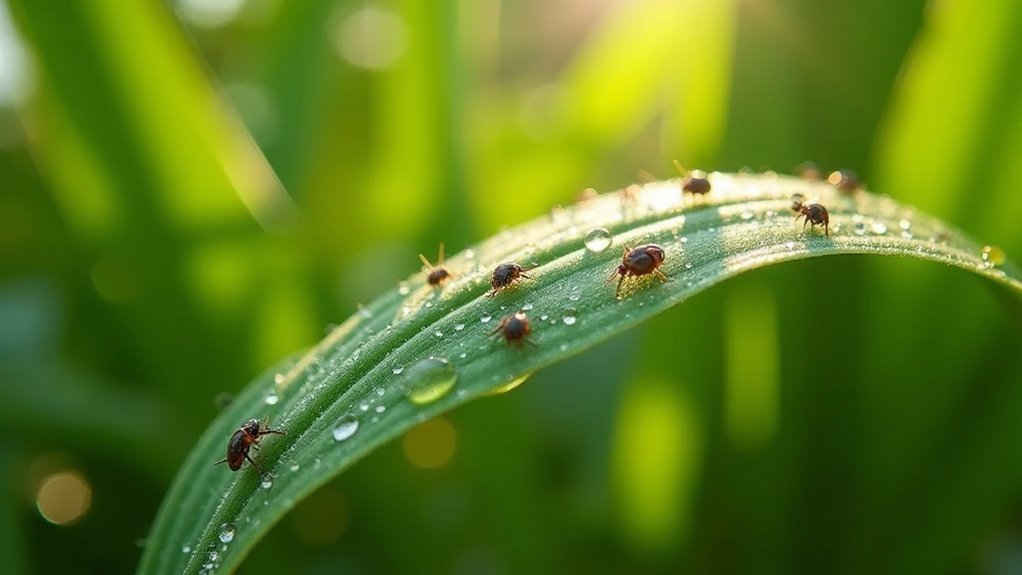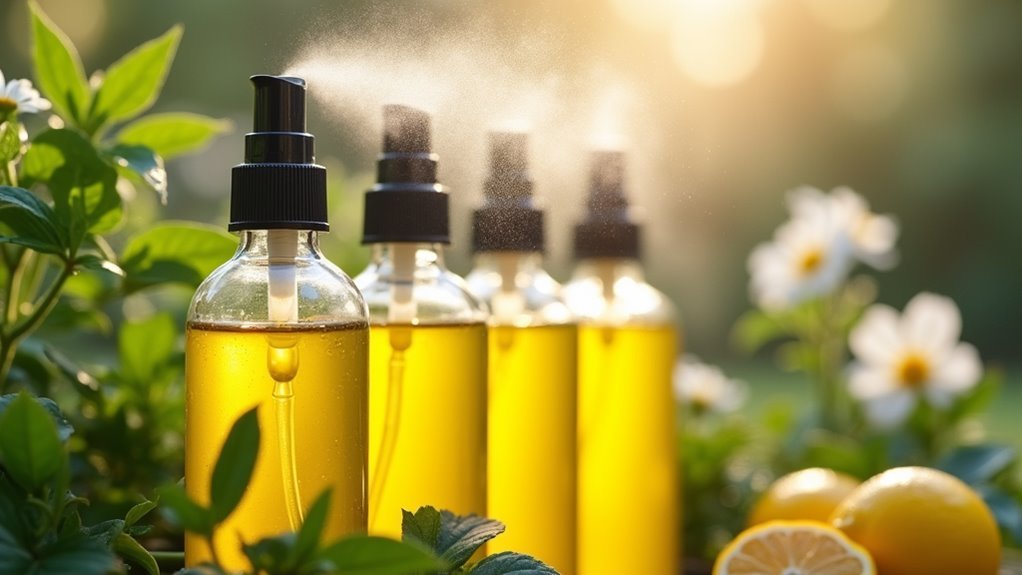You can create effective lemon oil garden sprays by mixing 2 drops of lemon essential oil with 2 ounces of water for basic pest control, or use concentrated versions with 1-2 tablespoons per gallon for heavy aphid infestations. Add biodegradable dish soap for better adherence against scale insects, combine with neem oil for enhanced protection, or mix with cayenne pepper to deter mammals. These eco-friendly solutions protect your garden while the detailed recipes below offer specialized approaches for every pest problem.
Basic Lemon Oil Garden Spray Recipe for Common Garden Pests

Creating an effective lemon oil garden spray requires just two simple ingredients you likely have on hand. Combine 2 drops of lemon essential oil with 2 ounces of water in a spray bottle to create this natural, effective pest deterrent. This simple mixture targets common garden pests like aphids and mosquitoes without harsh chemicals.
Since lemon essential oil doesn’t mix well with water, you’ll need to shake your spray bottle thoroughly before each use.
Apply this pest control solution every 5-7 days, focusing on leaf undersides where garden pests typically hide. Always test a small leaf area first to monitor your plant’s response, as essential oils can be potent and may affect sensitive plants differently.
Concentrated Lemon Oil Spray for Heavy Aphid Infestations
When aphids overwhelm your garden plants, you’ll need a more potent solution than the basic spray recipe.
When standard garden sprays fail against massive aphid colonies, it’s time to escalate to a more aggressive natural approach.
This concentrated lemon oil spray delivers powerful natural pest control for severe aphid infestations while remaining safe for beneficial insects when applied properly.
Mix 1-2 tablespoons of lemon essential oil with one gallon of water and add a few drops of biodegradable dish soap for better surface adherence.
Apply during early morning or late evening to protect pollinators and prevent leaf burn.
This homemade gardening solution requires reapplication every 7-10 days or after rainfall for continuous protection.
Always test on a small plant area first to check for adverse reactions before full application across your garden.
Lemon Oil and Dish Soap Combination Spray for Scale Insects

Scale insects present one of gardening’s most persistent challenges, forming hard protective shells that shield them from standard pest control methods.
You’ll need a specialized lemon oil and dish soap combination spray to penetrate their defenses effectively.
Mix one tablespoon of lemon essential oil with one tablespoon of biodegradable dish soap in a quart of water. The dish soap acts as a surfactant, helping the lemon oil adhere to scale insects and break through their protective outer layer.
Apply this spray directly to affected plant areas, concentrating on leaf undersides where these pests typically hide.
Repeat applications every 7-10 days until you’ve eliminated the infestation. Always conduct a patch test on a small plant section first to ascertain your mixture won’t cause adverse reactions.
Lemon Oil Spray With Neem Oil for Enhanced Pest Protection
For maximum pest control effectiveness, you’ll want to combine lemon oil with neem oil to create a powerful dual-action spray that targets garden pests through multiple mechanisms.
This potent mixture leverages lemon oil’s aromatic deterrent properties while neem oil disrupts insects’ hormonal systems, preventing feeding and reproduction.
Lemon oil repels pests naturally while neem oil interferes with insect development, creating a comprehensive garden protection system.
Preparation and Application Guidelines:
- Mix the solution – Combine 1-2 teaspoons of lemon essential oil with 1-2 tablespoons of neem oil in one gallon of water for proper dilution.
- Time applications wisely – Spray during early morning or late evening to prevent leaf burn and protect beneficial insects from exposure.
- Maintain regular schedule – Reapply every 7-14 days or after rainfall to guarantee continuous pest control protection throughout the growing season.
Weekly Maintenance Lemon Oil Spray for Preventive Garden Care

You’ll want to establish a consistent weekly application schedule to maintain your garden’s natural defense system against common pests like aphids and spider mites.
By applying lemon oil spray every 5-7 days, you’re creating a protective barrier that prevents infestations before they start rather than reacting to existing problems.
This preventive approach saves you time and effort while keeping your plants healthier throughout the growing season.
Weekly Application Schedule
Maintaining an effective pest prevention routine requires applying lemon oil spray every 5-7 days throughout the growing season. This consistent schedule guarantees maximum protection against garden pests while fostering a healthy garden ecosystem.
Your weekly applications should follow this systematic approach:
- Shake thoroughly before each use since essential oils don’t mix naturally with water.
- Target leaf undersides where pests typically hide and lay eggs.
- Monitor plant health weekly to adjust frequency based on pest activity and weather conditions.
Regular weekly applications provide dual benefits: deterring unwanted insects while minimizing chemical exposure in your garden.
After heavy rains, you’ll need to reapply sooner since water washes away the protective coating. This proactive pest prevention strategy maintains plant health and reduces the likelihood of severe infestations.
Preventive Treatment Benefits
| Benefit Category | Traditional Pesticides | Lemon Oil Sprays |
|---|---|---|
| Safety Profile | Chemical residues present | Safe around families |
| Environmental Impact | Harms beneficial insects | Preserves garden ecosystem |
| Application Frequency | As-needed treatments | Weekly maintenance schedule |
Essential oils like lemon actively repel whiteflies and other common pests while maintaining your garden’s natural balance. Regular use of these organic sprays reduces your reliance on harsh chemicals, promoting sustainable gardening practices.
Lemon Oil and Garlic Spray for Deterring Larger Garden Pests
While lemon oil alone works well against garden pests, combining it with garlic creates a powerful deterrent that’s particularly effective against larger invaders like aphids and beetles.
The sulfur compounds in garlic enhance lemon oil’s natural repelling properties, creating an even stronger barrier against unwanted insects.
Here’s how to make this effective spray:
- Mix ingredients: Combine 2 tablespoons of lemon oil with 2-3 minced garlic cloves in a quart of water.
- Steep overnight: Allow the mixture to sit for peak potency before straining out garlic pieces.
- Apply strategically: Spray directly on leaves and stems during early morning or late evening.
You’ll protect beneficial insects by timing applications correctly.
Reapply every 5-7 days to maintain your garden’s protective barrier without introducing harmful chemicals into your ecosystem.
Diluted Lemon Oil Spray for Delicate Plants and Seedlings
For delicate plants and seedlings that require gentler care, you’ll need a more diluted approach that maintains pest protection without overwhelming tender foliage.
Create your diluted lemon oil spray using just 1-2 teaspoons per quart of water to protect seedling health while managing pest pressure effectively.
For tender seedlings, mix only 1-2 teaspoons of lemon oil per quart of water to ensure gentle yet effective pest management.
Always test the solution on a small leaf area first to check for adverse reactions.
Apply during evening or early morning hours to prevent leaf burn and protect beneficial insects from disruption. This timing also maximizes the spray’s effectiveness against target pests.
Reapply every 5-7 days to maintain consistent protection.
Beyond pest control, lemon oil’s natural antibacterial properties help prevent fungal infections that commonly threaten young plants, making this treatment doubly beneficial for delicate plants.
Lemon Oil Spray With Cayenne Pepper for Mammal Deterrent
Larger garden invaders like rabbits, squirrels, and deer require a more aggressive approach than standard insect pests. This lemon oil spray combined with cayenne pepper creates a powerful deterrent that’ll effectively repel mammals from your garden.
The capsaicin in cayenne pepper acts as an irritant, while the acidic lemon oil provides additional repelling properties and leaves a pleasant scent.
To create this potent mixture:
- Mix 2 tablespoons lemon essential oil with 1 tablespoon cayenne pepper in 1 quart water
- Shake thoroughly before each application to guarantee proper ingredient distribution
- Test on small plant areas first to prevent damage to sensitive foliage
Reapply every 5-7 days or after rainfall to maintain effectiveness against these persistent pests.
Organic Lemon Oil Spray for Edible Vegetable Gardens
When growing vegetables you plan to eat, you’ll want a gentler approach than the aggressive mammal deterrent spray. Organic lemon oil spray provides effective pest control for edible gardens while protecting beneficial insects like bees and ladybugs.
Mix 1-2 teaspoons of lemon essential oil per quart of water to achieve the proper diluted concentration that won’t damage your plants. This natural solution effectively repels aphids and spider mites without introducing harmful chemicals to your food crops.
Apply every 5-7 days, especially after rainfall, to maintain consistent protection throughout the growing season. The pleasant citrus aroma enhances your garden experience while deterring pests.
Incorporating this method into your sustainable gardening practices reduces reliance on synthetic pesticides, creating a healthier ecosystem for both your family and the environment.
Long-Lasting Lemon Oil Spray With Natural Emulsifiers
While basic lemon oil and water mixtures work well for short-term pest control, adding natural emulsifiers creates a more durable and effective spray that’ll withstand weather conditions.
Long-lasting lemon oil formulations with lecithin or vegetable glycerin improve adherence to plant surfaces, maintaining their insect repellent properties even during rain or humidity.
To create an effective spray against common garden pests like aphids and spider mites:
- Mix 1-2 teaspoons lemon essential oil with 1 quart water
- Add natural emulsifiers for better oil-water blending
- Apply during evening or early morning for cooler temperatures
For best results, spray when beneficial insects are less active.
The enhanced formula provides superior coverage and longer-lasting protection compared to basic mixtures, making it particularly effective against whiteflies and other persistent garden threats.
Frequently Asked Questions
What Bugs Are Repelled by Lemon Oil?
Lemon oil repels aphids, mosquitoes, spider mites, ants, and flies from your garden. You’ll find its strong citrus scent and limonene compounds create an environment these pests avoid while keeping beneficial insects safe.
How Do I Make Citrus Spray for My Garden?
You’ll combine zest from 1-2 lemons with 2 cups water, steep overnight, then strain. Alternatively, mix 1 cup citrus juice with 1 quart water and add biodegradable dish soap for better plant adhesion.
What Can I Spray on My Vegetable Garden to Keep Bugs Away?
You can spray lemon oil on your vegetable garden to repel bugs naturally. Mix two drops of lemongrass essential oil with water, apply every five to seven days for effective pest control.
What Is the Best Oil for Garden Pests?
You’ll find lemon essential oil works best for garden pests due to its limonene content that disrupts insect behavior. It’s effective against aphids, spider mites, and mosquitoes while being safe for beneficial insects.
In Summary
You’ve got nine powerful lemon oil spray recipes to tackle any garden pest problem. Start with the basic recipe for everyday use, then switch to specialized formulas when you’re dealing with specific infestations. Don’t forget to test on a small area first and apply during cooler parts of the day. With these natural solutions, you’ll keep your garden healthy without harsh chemicals while saving money on commercial pesticides.





Leave a Reply